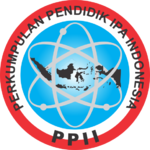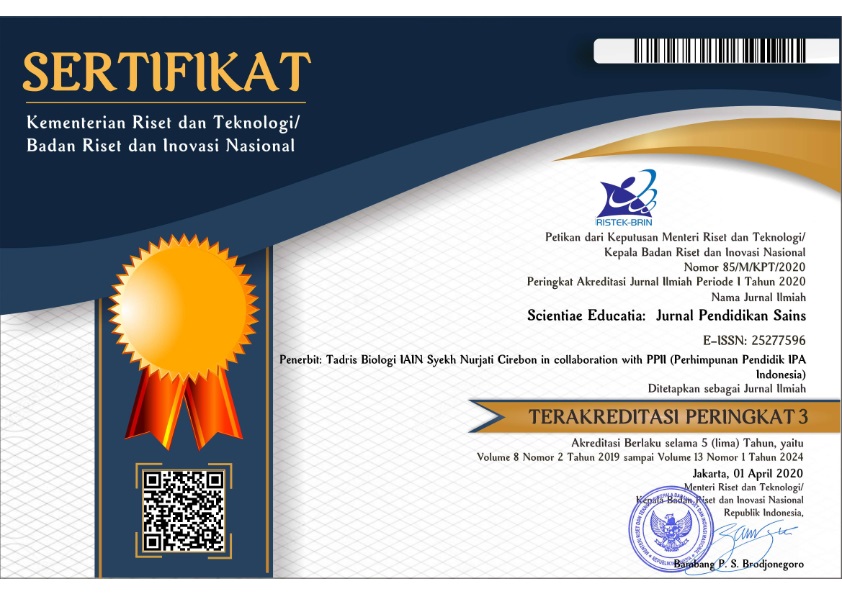Analysis of Friction Force, Centripetal Force, and Maximum Speed Concepts on Piket Nol Lumajang Route as a Physics E-Module Design
(1) Physics Education, Jember University
(2) Physics Education, Jember University
(3) Physics Education, Jember University
(*) Corresponding Author
Abstract
The cause of students' difficulties in understanding physics material is that students cannot relate formal knowledge in everyday life and the lack of contextual teaching materials. One way to overcome these problems is to examine examples of events in students' lives to serve as a reference for designing teaching materials. The Lumajang’ Piket Nol Line has extreme track characteristics and accidents often occur. This analysis aims to examine the friction force, centripetal force, and maximum speed on the Piket Nol Line and the results of the analysis are used as a reference for designing physics teaching materials in the form of e-modules. The method used in this research is content analysis. The object of this research is four trajectories which were chosen by the researcher because there had been an accident. The four tracks include a straight track, a straight incline / decline, a flat bend, and an uphill / downhill bend. The results of this analysis are the amount of friction force, centripetal force, and maximum speed that increases when the initial speed is greater. The results of the analysis were used as a reference for the design of contextual e-modules in the form of flipbooks.
Keywords
References
Addinni, F. N., Bachtiar, R. W., & Prastowo, S. H. B. (2017). Study of Kinematics and Dynamics of Motion on the Gumitir Mountain Trail as a Physics Teaching Material Design in High School. FKIP e-Proceeding, 2(1), 1-11.
Agustin, H., Rifai, M., & Ediyono, S. (2022). When the Remnants of a Volcanic Eruption Become a Tourism Commodity: Risk Analysis of Lava Tour Tour Object of Merapi Yogyakarta. Journal of Community Health, 8(2), 219-228.
Ariyanti, I., Lesmono, A. D., & Supriadi, B. (2019). Feasibility of Macromedia Flash-based Flow Virtual Simulation E-Module. Journal of Physics Learning, 8(3), 215-221.
Astutik, S., Lesmono, A. D., & Adani, D. A. L. (2019). The Effect of Collaborative Creativity (CC) Model on Science Literacy and Physics Learning Outcomes of High School Students. Saintifika, 21(1), 9-22.
Azizah, S., Handayani. R. D., & Maryani, M. (2021). Analysis of Vehicle Motion in Accident Cases as Teaching Material for Physics in High School. Edutech Undiksha Journal, 9(1), 40-47.
Cahyanto, A., Handayani, R. D., & Lesmono, A. D. (2022). Development of Interactive E-Modules Based on Articulate Storyline 3 to Train Critical Thinking Skills on the Subject of Sound Waves. Journal of Physics Education Literacy (JLPF), 3(2), 154-164.
Fadieny, N., & Fauzi, A. (2021). Validity of Physics E-Modules Integrated with Experiential Learning-Based Lightning Disaster Material. Journal of Physics Learning Research, 7(1), 17-25.
Giancoli, D. C. (2014). Physics: Principles and Applications 7th Edition Volume 1. Jakarta: Erlangga.
Harefa, A. R. (2019). The role of physics in everyday life. Warta Dharmawangsa, 13(2).
Haryadi, R., & Nurmala, R. (2021). Development of Contextual Physics Teaching Materials in Increasing Student Learning Motivation. Spektra: Journal of Science Education Studies, 7(1), 32-39.
Ministry of Education and Culture (2017). Practical Guide to the Preparation of Learning E-Modules. Jakarta: Directorate of High School Development.
Ministry of Education and Culture (2016). Analysis of Local Wisdom in View of Cultural Diversity. Jakarta: Center for Data and Statistics on Cultural Education (PDSPK) Ministry of Education and Culture RI.
Krippendorff, K. (2004). Content Analysis: An Introductions to its Methodology (Second Edition). California: Sage Publication.
Laumma, M. A. (2022). Review of Braking Force on Four Wheel Vehicles. JNSTA ADPERTISI Journal, 2(1), 28-32.
Mara, I. M., Okariawan, I. D. K., & Aziz, S. (2023). Analysis of the Required Braking Force on the Faculty of Engineering Unram Electric Car with Variations in Vehicle Speed and Load. Energy, Materials and Product Design, 10(10), 1-7.
Mauliza, R. I., Sabrina, T. B., & Maulana, W. (2019). Vehicle Speed Violations on the Cipularang Toll Road. Reka Racana: Journal of Civil Engineering, 5(1), 39-49.
Negoro, R. A. (2019). Efforts to Build Science Process Skills Through Inquiry lLarning Assisted by Centripetal Force Props. Journal of Physics Education and Science (JPFK), 5(1), 45-52.
Nupus, H., Triyogo, A., & Valen, A. (2021). Development of Teaching Materials For Contextual-Based Integrated Thematic Companion Books For Elementary School Students. Basicedu Journal, 5(5), 3279-3289.
Pasaribu, M. N. H., Siregar, M. I., & Susilo, H. Analysis of Car Tire Friction Force Interaction with Road Surface Structure. RODA: Journal of Automotive Education and Technology, 3(2), 12-19.
Pramesti, Y. T., & Budiharjo, A. (2020). Effectiveness of Speed Limit Signs on Collector Roads. Engineering Journal, 18(2), 73-81.
Primayana, K. H., Lasmawan, I. W., & Adnyana, P. B. (2019). The Effect of Environment-Based Contextual Learning Model on Science Learning Outcomes in View of Outdoor Interest in Class IV Students. Indonesian Journal of Science Education and Learning, 9(2), 72-79.
Puspita, A. M. I., & Purwo S. (2019). The Influence Of Literary-Based Teaching Materials With The Approach Contextual On Primary School Student Learning Outcomes. Al-Aulad: Journal of Islamic Primary Education, 2 (1), 2019, 1-7
Qondias, D., & Winarta, I. K. A. (2019). Development of Teaching Materials Based on the Scientific Approach in the Research Methodology Course. Journal of Educational Research and Development, 3(2), 145-148.
Rahmadi, D. (2022). Biomechanical Analysis of the Momentum of the Attack Movement on the Success of Fencing Athletes. Digilib UNS, 1-5.
Ruspitasari, H., Supeno, S., & Yushardi, Y. (2022). Study of Motion Kinematics in Motor Vehicle Motion on Ngawi Regency Road as a Physics Learning Resource. ORBITA: Journal of Physics Education Studies, Innovations and Applications, 8(2), 282-292.
Syifaurrahman, D., Fauzan, M., & Sudibyo, T. (2019). Evaluation of Geometry and Equipment of Leuwiliang Ring Road, Bogor. Journal of Civil and Environmental Engineering, 4(2), 149-168.
Soif, M. (2022). The Effect of Experiment Method on Student Learning Outcomes in Physics Mechanics Lessons Especially About Friction Forces at MAN 1 Palembang 2020. Journal of Perspective, 15(1), 86-95.
Widiastuti, N. L. G. K. (2020). Development of Contextual-Based Science Teaching Materials With The Concept of Tri Hita Karana to Improve Students' Concept Understanding. Scientific Journal of Education and Learning, 4(3), 479-490.
Wulandari, P. S., Lestyana, H. R., & Tranggono, J. F. (2021). Sustainable road-kill mitigation in Gladak Perak Bridge at Lumajang, Indonesia. Conference Series: Earth and Environmental Science, 907(1), 1-21.
Virani, W. S., Supeno, & Supriadi, B. (2018). Study of Motion Kinematics on High Risk Accident Location Paths (Blackspots) as a Physics Learning Resource in High School. Journal of Physics Education Research and Studies, 5(1), 22-29.
DOI: 10.24235/sc.educatia.v13i1.16517
Article Metrics
Abstract view : 2 timesRefbacks
- There are currently no refbacks.
Scientiae Educatia: Jurnal Pendidikan Sains indexed by:

This work is licensed under a Creative Commons Attribution 4.0 International License.
Stat Counter (Link)



1.png)












